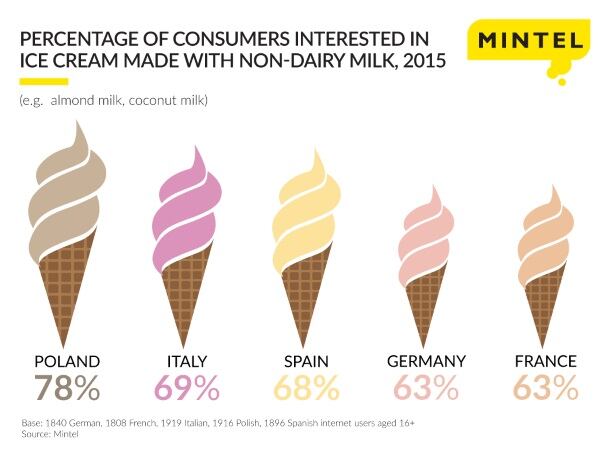Dairy alternatives are no longer strictly marketed to consumers with special dietary requirements, but appeal to a wider health-conscious consumer base, says Mintel.
Caroline Roux, research manager food and drink UK at Mintel, told DairyReporter that “Adventuresome millennials and their changing food preferences are responsible for the increase in non-dairy milk introductions in Europe.”
Analyzing the results
The Mintel research polled more than 9,300 internet users aged 16+ in Germany, France, Italy, Poland and Spain.
It found nearly two-thirds (63%) of German ice cream consumers are interested in non-dairy alternatives, such as ice cream made with almond or coconut milk.
The high demand for non-dairy ice cream is also evident in other key European countries, with interest signaled by 78% of Polish, 69% of Italian, 68% of Spanish and 63% of French consumers.
Price doesn’t seem to be a factor, as the study says one in five (20%) Germans say that they would be willing to pay more for non-dairy ice cream, rising to nearly one third (30%) among 16 to 24 year olds.
Alternatives are a lifestyle choice
The study showed that this willingness to spend more on such alternatives seems to be repeated in the European countries polled, with 27% of consumer in Poland, 21% in Italy, 25% in Spain, and 18% in France agreeing they would pay a premium price for these options.
Julia Buech, food and drink analyst at Mintel, said, “While dairy alternatives were originally created for consumers with special dietary requirements, such as those who are lactose intolerant or suffering from allergies, today they represent more of a lifestyle choice, especially among younger generations.
“This is based on a strong combination of health and ethical reasons, as well as evolving taste preferences and the appeal of novel flavors.”
More dairy-free launches
Dairy-free ice cream is gaining ground in Germany, where the share of non-dairy launches has reached 8% of total ice cream introductions (excluding sorbets), compared to just 2% between 2013 and 2014, according to Mintel’s Global New Products Database (GNPD).

In wider Europe, non-dairy ice cream is also expanding its niche, albeit at a more modest pace. According to Mintel, in 2015 the share of new dairy-free introductions reached 3% in Europe overall, up from 2% in 2014 and 1% in 2013.
The decline of soy
While soy milk was initially widely touted as the alternative to milk, launch activity in Germany’s non-dairy ice cream sector is increasingly shifting from soy to other alternatives, such as almond, coconut, rice and now even lupine.
The study shows the share of soy-based launches decreased from close to 100% in 2012 to 35% in 2015.
“While soy’s image has suffered from negative associations related to both health and the environment, new non-dairy ice cream alternatives have profited from a taste and texture standpoint,” said Buech.
Roux added that almond has emerged in the second place to soy among new product non-dairy drink formulations.
“Soy ingredients appeared in 45% of new non-dairy drink introductions globally in 2015, while almond ingredients were found in 23% and rice in 19%. In 2016, coconut and cashew are likely to gain as well,” she told DR.
New products being introduced
Roux said that other products are likely to gain ground, too.
“Cashew and tigernut are still relatively niche varieties that have potential to go mainstream. Tigernut has gained notoriety in recent years due to its Paleo-friendly qualities,” she said.
Roux added that recent introductions in Germany have even pointed to lupine as the next non-dairy trend.
Optimizing flavor
Mintel’s trend “Alternatives Everywhere” shows consumers are attracted to the health benefits and flavors of non-dairy products, Roux noted.
“That will likely lead to more blending of non-dairy products in the future as manufacturers seek to optimize flavor and health benefits,” she told DR.
Free-from positives
Roux said that free-from foods also have an impact.
In 2015, Germany launched 26% of all new non-dairy ice creams
“There is also a background belief that they are more natural than standard products (for 20% of consumers eating free-from foods).”
The study notes that organic and ethical-production claims are also on the rise, accounting for 90% of all newly introduced non-dairy ice cream products in Germany in 2015.
This comes as almost half (47%) of German consumers are interested in buying organic ice cream, with 28% willing to pay more for it - rising to two out of five (37%) 25-34 year olds.
Meanwhile, 59% of Germans show an interest in ice cream that contains locally-sourced ingredients such as milk from local farmers, and 50% of German consumers are keen on buying ice cream that is handmade.
Germany overtaking UK for innovation
Even though the UK has been the most innovative non-dairy ice cream market, it looks like German manufacturers have upped their game in 2015, says Mintel.
The UK was leading non-dairy ice cream innovation between 2013 and 2015 overall, accounting for 19% of total launches in Europe, followed by Germany (16%) and Italy (14%). However, in 2015, Germany launched 26% of all new non-dairy ice creams, outpacing both the UK (17%) and Italy (12%).
